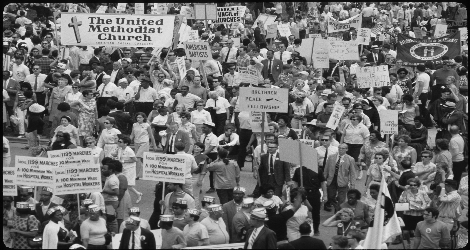[wpcol_1half id=”” class=”” style=””]
Theology’s Right to Speak
Economics can come to replace theology for many reasons because they are addressing, not two different unrelated areas of human inquiry, but, in fact, very similar questions of who human beings are and for what purposes they exist. In the 18th century, as a result in part of Immanuel Kant’s philosophical work, theology’s relevance was quarantined. Kant’s philosophical work reserved for theology only the role of helping humanity navigate the realm of values. Meanwhile, economics was gifted with the label “science,” and thus all of the thinking surrounding it, including its way of understanding human purpose and behavior, became our primary way of understanding how human beings do and should behave within the realm of the “objective science of commerce.” One problem with this fact/value distinction is that it ignores the values that inform the sciences, especially the social sciences. We thus have lost an understanding of the subjectivity that influences thinking about scientific matters, and the objectivity that is infused in thinking about ethical matters. The result is that we have been fed a lie; that the “science” of economics deals with the way things are, and that theology deals with mere values, the way things should be or could be, were human life and choice not constrained by “the facts.”
This fact/value distinction, at its most pernicious, allows free market worshippers to pass off the policy priority they champion (market freedom at any social or environmental cost) as “fact.” In reality, that policy has been cultivated in the soil of various value-laden assumptions.
Let us be clear. Economics is a serious discipline worthy of respect. The subjective realm can be an incredibly creative space—as long as we do not thrust one tradition into that space while claiming “objectivity” for ourselves. Economists, this means, are not just accountants fine tuning our systems of material production and analyzing hard data to enhance our ability to create wealth. They are philosophers of human action and purpose. As such, they often venture into the realm of moral philosophy, part of the small realm modernity preserves for theology around the edges of the “hard” sciences.
Theologians, that is, all Christians, thus have not only a perfect right, but perhaps also a duty, to walk resolutely back through the door economists have left open between the two disciplines. There, we must loudly insist that theology, with its understanding of the good, the beautiful and the true, as well as its understanding of human ends and appropriate means, be allowed to inform its sister discipline—just as the sciences have been allowed to form, shape and challenge theological inquiry.
[/wpcol_1half] [wpcol_1half_end id=”” class=”” style=””]
As Stephen Long argues in his book Divine Economy, the “is” of modern economics can only be challenged when the “ought” of a theological telos (or goal of human life and a corresponding description of human behavior) is allowed to reorder both our understanding of our economic system and our expectations of it. Long uses the work of Alasdair MacIntyre, a moral philosopher, to argue that we must make room for the primacy of theological virtues over the a-rational attachment of modernity to “value,” which is determined at the level of the individual.
Instead, Long claims, modern economics narrows the question governing all economic exchanges to one: If this transaction goes through, will I personally be better off? This question is now, perhaps, the most salient one governing not only our economic, but also our political decision making. The result is a constraint on the development of community-wide dialogue around what constitutes the common good. Long points out that this is just one reason we should allow Alisdair MacIntyre’s work to tear down the false walls we have allowed to be constructed between the two realms of thought. To the extent that economic theory and theology both claim territory in the same realm, more specifically as they both make claims about the bases of human action, they are talking about the same thing in two different ways.[3]
The very word “economy,” after all, is derived from the Greek word oikonomia, which occurs throughout the New Testament (1 Timothy 1:4; Ephesians 1:10; 3:2; 3:9; 1 Corinthians 9:17; Colossians 1:25). Oikonomia is (repetitious with Verhey) the law or rule of the household. In theological terms, God is like an immensely wealthy householder who desires to dispense God’s unsearchable riches (Ephesians 3:8) to all of God’s people, the members of the household. However, to accomplish this enormous task God needs a plan, an arrangement, an economy. Can we doubt, given this, that God cares about our economic rules, that God has some skin in the game when it comes to questions about how we are going to set up our commercial homes? How could we possibly imply that the structures we set up to govern the dispensing of goods and services, the rules of our commercial houses, are somehow immune to critique by, or are perhaps even shaped by, the rules God has set up to govern God’s world? Far from being inappropriate, it is now imperative for theological reflection to inform economic policy making.
[/wpcol_1half_end]






Unbound Social